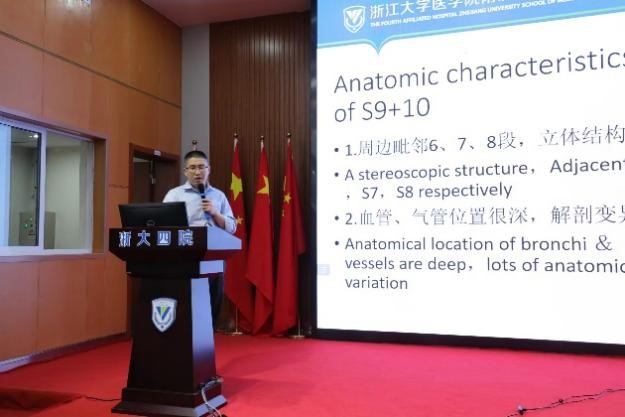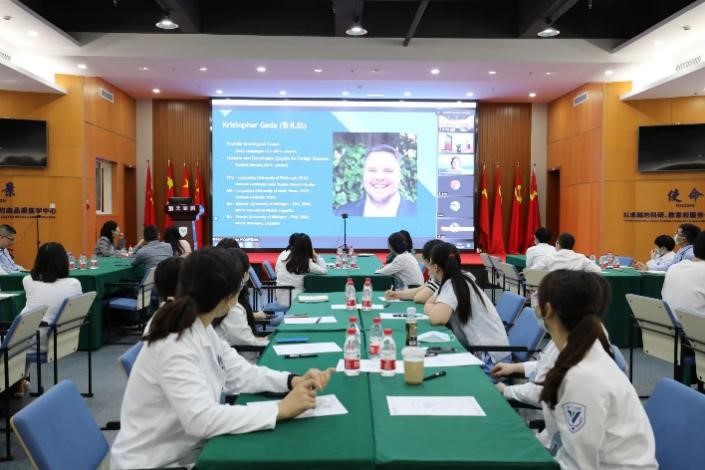“Today, I am going to talk about Uniportal VATS RS9+10 Segmentectomy (Reverse path).” An academic speech was delivered in English by Dr. YU Jianghao, from the Cardiothoracic Surgery Department, as a member participating in International Aptitude Training (IAT).

On the afternoon of May 24th, the Fourth Affiliated Hospital, Zhejiang University School of Medicine (ZJU4H) held its third IAT on the theme of “Academic and professional presentations in English to international audiences”. Dr. Kristopher Geda, the Coordinator of the English for Foreign Students program at Stanford University, gave his 2nd lecture online. Over 50 interested medical professionals and administrators from the hospitals, as well as other teachers from Zhejiang University, attended the IAT both online and on-site.

As required, the participants finished the homework and shared their feelings about the IAT. Kong Hanbin, a teacher at Zhejiang University, said, “Thanks for providing a great online English-learning opportunity! It is intriguing and easy to understand. And Dr. Geda also assigned the homework to us for reviewing what we learned. I am deeply inspired and look forward to the next course.” Huang Shaoting, aninternational service clinicnurse from ZJU4H, said, “Yiwu is the world’s largest wholesale market for small commodities. Each year more than 10,000 foreign visitors from different cultural backgrounds come here for medical services. What I learned in IAT taught me how to better communicate with foreign patients. I benefitted a lot.” The IAT has received enthusiastic participation and a great response from the audience.
Actually, to better understand the current situation of medical professionals’ English learning in ZJU4H, the Office of International Affairs distributed a questionnaire and got back 457 responses. The results found that it’s hard to learn English due to the absence of a robust atmosphere and a specialized teacher. Besides, the participants did not have enough time and energy to learn and improve their English proficiency since they were so devoted to their clinical work. Therefore, to address the difficulties that are encountered when facing multinational patients, the best course of action is to implement IAT in hospitals. All of this is conducive to cultivating the internationalization of medical professionals in the areas of teaching, scientific research and management for the construction of the International Hub for Health (IHH): The Fourth Affiliated Hospital, the International School of Medicine, and the International Institutes of Health, Zhejiang University.
“Interacting with patients and clients across multiple countries is becoming increasingly common and useful for medical professionals in the ZJU4H. However, these communications entail additional challenges based on linguistic, cultural and regulatory differences. Effective communication skills are essential to patient safety, well-being and overall satisfaction,” remarked Prof. WANG Kai, President of ZJU4H, at the launch meeting of IAT.
(Prof. WANG Kai delivered a speech at the IAT launch meeting)
“Internationalization is an important strategy of the IHH. The IAT invites experts with rich international experience to help our medical education, research and management team to further build an international mindset, broaden our international vision and better serve the upcoming IHH,”Dr. CHEN Weiying, the Associate Dean of the International School of Medicine, Zhejiang University, also stated the significance of IAT.
(In the first course on February 28th, Professor Huang Huaxin, from the department of medical humanities at Zhejiang University, addressed a speech on the topic of “Concept Change and Thinking Innovation: Creating a High-quality Development Model of IHH”.)
(In the second course on March 29th, Dr. Kristopher Geda at Stanford University gave a lecture on the theme of “English for Healthcare Professionals”.)
Source:the Fourth Affiliated Hospital, Zhejiang University School of Medicine